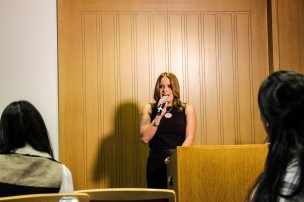Latin@ Affirmation Month kicked off this Sunday with “Convocation,” a roundtable discussion centered on Latinas/os in the media.
Latin@ Affirmation Month kicked off this Sunday with its opening Convocation, featuring keynote speaker Maria Santana ’98. The event, which featured current members of Ajùa Campos—a student group promoting Latino cultural values and political issues, and which organized the event—aligned with the month’s larger theme of “Latinas/os In the Media: Our Roles and Representations.”
The event was co-sponsored by a number of departments, including Romance Studies; American Studies; African American Studies; Feminist, Gender, and Sexuality Studies; Government; and English.
The ceremony opened with representatives from Ajùa Campos recounting the club’s history and tracing the club’s relevance to the present day. The club takes its name, “Ajùa,” from a Mexican war cry during the Mexican-American war, and “Campos” is the last name of Pedro Albizu Campos, a legislator who fought for Puerto Rican independence in the 1930s and ’40s.
“The organization gave its members community, and ensured that they had a place and a family at Wesleyan,” said Sam Leiva ’16 in his opening speech. “Ajùa Campos’ efforts were to make Wesleyan a more livable and desirable place for students.”
Roberto Rivera and Lad Santiago, both in the Class of 1974, were among the founders of Ajùa Campos at a time when there were very few Latin@s at the University. Since its inception, the club has pushed for and attained a Latina/o student house, affirmative action to admit more Latin@ students, special attention and academic advising, and more Latin@ professors. This community has since grown from eight students in the club’s first years to around 10 percent of the student body today.
Following the introduction, freshman speaker Katherine Puntiel ’19, a self-identified Afro-Latina, spoke about her experience being a multiracial student of color during her first few months at college. Her speech addressed her family’s sacrifices to get her to Wesleyan and what she is learning along the way.
“I am able to use my personal upbringing to allow me to navigate my Wesleyan experience,” Puntiel said. “Being with Ajùa Campos is allowing me to recognize my Latina side with an atmosphere of la familia. This is the moment when I am truly learning to accept my Latina Dominican identity.”
Senior speaker Christian Núñez ’16, an English and theater double major, reflected on his growth both in and out of the classroom throughout his college years.
“I learned more about what it meant to be a Latino than I ever did in the Bronx,” Núñez said. “I was able to learn about history, and the often-silenced discussion of intersectionality. I’m one of the very few people of color in the theater major, and although I am put into uncomfortable situations in discussions both in and outside of classrooms, I make sure to take back control and disrupt that space because I can.”
The event closed with a keynote address from Emmy-nominated TV journalist Maria Santana ’98. A correspondent for CNN en Español, she has covered major news stories including the Sandy Hook shooting and the Boston marathon bombing. Her speech included themes of inclusion in the media.
Santana recounted her journey as a first-generation Dominican immigrating to America at age four to becoming a student at the University, as well as a member of Ajùa Campos herself. She explained that being at the University helped in improving her Spanish and also taught her to question authority.
Although she stressed that she sees herself as a journalist first, Santana spoke about how she uses her Latina heritage and perspectives to find stories to share, especially in terms of not turning away potential subjects because of a language barrier.
“Being Latina helped me see things which others may have not,” Santana said. “It’s not about finding the story, it’s about finding the connection to people long after the other cameras have stopped rolling.”
She further spoke to the benefits of her education at the University.
“[My education] taught me not to be intimidated by power, but to ask questions,” she said. “[To current students,] don’t ever settle for what they offer you, if you realize what you can do, never take no for an answer.”
Ultimately, the event not only spanned generations of Latin@ students at the University in order to paint a cohesive narrative of the presence on campus, but it also aimed to include the wider student body.
“I invite you all to create a stronger Latino and student of color community on campus, and continue to reach out to other groups so that we as Wesleyan students become a collective community to support one another,” Leiva said.
Upcoming Latin@ Affirmation Month Events include Talk series on “The Maid, the Outsider, and the Spicy Latina—Deconstructing the Latina” on Thursday, Nov. 5, and “Latin@s in Politics and the Latin@ Vote” on Thursday, Nov. 12.

1 Comment
Debbie
“The club takes its name, “Ajùa,” from a Mexican war cry during the Mexican-American war”
Soy chicana, pero me alegra que los E.E.U.U. ganó esa guerra. Si no hubiera ganado, yo estaría viviendo en el pozo negro del tercer mundo que es México (vivo en “Aztlán”). Es mucho mejor ser estadounidense. ¡Viva los Estados Unidos!